
Understanding Bengal Kittens for Sale
Bengal kittens have been a rising star in the world of feline companions, known for their exotic appearance that resembles that of a wild leopard. Their striking coat patterns, pair beautifully with lively personalities, making them highly sought after by cat enthusiasts. For those looking to welcome a Bengal into their lives, understanding the nuances of Bengal kittens is essential. In this article, we will delve deep into what makes Bengal kittens special, how to find one for sale, and tips on raising them to ensure a long and happy life together. If you’re interested in bringing one of these stunning creatures home, explore Bengal Kittens for Sale to find a perfect companion.
1. What Makes Bengal Kittens Unique?
Bengal cats, developed in the late 20th century, are a hybrid breed, resulting from crossbreeding domestic cats with the Asian leopard cat. This lineage gives them their stunning appearance, along with attributes that stand out in numerous ways:
- Aesthetic Appeal: Their coat comes in a variety of colors and patterns, notably rosetted or marbled. Bengals have a luxurious, sleek coat that shines beautifully in the light.
- Active Personality: Bengals are intellectually stimulating pets that require engaging activities. They often enjoy playing fetch, leash walking, and other interactive games.
- Social Nature: These cats tend to be outgoing, friendly, and can form strong bonds with their human families, making them excellent companions.
2. Key Characteristics of Bengal Kittens
Understanding the characteristics of Bengal kittens can help prospective owners gauge whether they are the right fit for their lifestyle. Here are the key traits that define these captivating creatures:
- Size: Bengals are medium to large-sized cats, weighing between 8 to 15 pounds, with females typically a bit smaller than males.
- Intelligence: Highly intelligent, Bengal kittens can be trained to perform tricks, respond to commands, and even walk on a leash.
- Vocalization: Bengals are known to be quite vocal, often using chirps, purrs, or meows to communicate their needs and feelings.
- Playful Nature: They are extremely playful, needing ample stimulation and playtime to prevent boredom, which can lead to behavioral issues.
- Grooming Needs: Bengal kittens require minimal grooming due to their unique fur, which is low-shedding and requires occasional brushing to remove loose hair.
3. Popular Variants and Their Prices
With a variety of coat colors and patterns available, the pricing of Bengal kittens can vary significantly based on their markings, lineage, and breeder reputation. Common variants include:
- Brown Spotted Bengals: These are the most common and popular type, often priced between $1,500 to $3,000.
- Snow Bengals: Characterized by a lighter coat, snow variants can range from $2,500 to $5,000 depending on the pattern and breeder.
- Marble Bengals: Unique for their swirling patterns, marble Bengals typically range between $1,500 to $4,000.
- Silvery Bengals: Often considered rare, these Bengals can fetch prices from $2,500 up to $6,000, particularly for show-quality examples.
How to Choose the Right Bengal Kitten
Finding the right Bengal kitten requires careful consideration and research. Here are the main factors to help guide your decision:
1. Factors to Consider Before Buying
Before you embrace the idea of getting a Bengal kitten, consider the following factors:
- Time Commitment: Bengals thrive on stimulation and companionship. Assess whether you can provide enough interactive time and attention.
- Home Environment: Ensure your living space can accommodate a Bengal’s energy levels. They need space to climb, explore, and play.
- Other Pets: Consider how a new kitten will fit with your existing pets. Bengals can be assertive, so proper introductions are essential.
2. Finding a Reputable Breeder
Finding a responsible breeder is crucial to ensure the health and temperament of your Bengal kitten. Here are tips on how to find a reputable source:
- Research Breeders: Look for breeders who are recognized by cat associations such as The International Cat Association (TICA) and the Cat Fanciers’ Association (CFA).
- Ask for Health Clearances: Reputable breeders should conduct health tests on their breeding cats to ensure that hereditary conditions are not passed on.
- Visit the Cattery: Ideally, visit the breeding facility to see the living conditions and how the kittens are raised. Socialization from an early age is key for Bengal kittens.
3. Tips for Meeting Your Kitten’s Parents
Meeting the kitten’s parents can provide insight into the temperament and health of the kittens. Here are some tips to consider:
- Observe the Parents’ Behavior: Friendly, playful, and well-socialized parents can indicate that the kittens will likely exhibit similar traits.
- Ask About Their Health: Inquire about the health history and any potential concerns that the parents may have had.
- Look for Interaction: A good breeder will allow you to interact with the parents. This interaction can help you gauge how the kittens might behave in a home environment.
Preparing for Your New Bengal Kitten
Once you decide on a Bengal kitten, preparation is key to ensuring a smooth transition into your home. Here are essential steps to follow:
1. Essential Supplies for Your Kitten
Gathering the right supplies before your kitten arrives is essential. Here’s a checklist of must-have items:
- Food and Water Bowls: Choose sturdy, easy-to-clean bowls. Stainless steel is a great option.
- Quality Kitten Food: Select a high-quality kitten formula that meets their nutritional needs.
- Litter Box: Ensure you have a litter box set up with litter that’s comfortable for a kitten.
- Scratching Post: Bengals need to scratch; provide a sturdy post to prevent furniture damage.
- Toys: Invest in various toys to engage your kitten’s energy and intellect.
2. Setting Up a Safe and Comfortable Environment
Creating a welcoming space for your Bengal kitten is vital. Here are ways to enhance their environment:
- Designate a Play Area: Ensure that the area is safe and free of hazards like cords or small objects that could be chewed on or swallowed.
- Give Them Hiding Spots: Bengals love to explore and hide. Box toys and cat trees can provide safe spaces for them to retreat.
- Temperature Control: Maintain a comfortable room temperature, as Bengals are sensitive to extreme cold.
3. Tips for a Smooth Transition
Making your new Bengal feel at home will take time. To ensure a smooth transition, consider the following:
- Limit Their Space: Initially, restrict them to one room with their essentials until they adjust and feel comfortable.
- Stay Calm: Your kitten will sense your emotions. Stay calm and allow them to explore at their pace.
- Scheduling Regular Playtime: Engage in playtime to help build trust and strengthen your bond.
Health and Care for Bengal Kittens
Like any breed, Bengals come with specific health considerations and care needs. Here’s how to keep your new pet healthy:
1. Routine Health Checks and Vaccinations
Regular veterinary care is paramount. Here are key points to consider:
- Regular Check-Ups: Schedule annual veterinarian visits to monitor your kitten’s overall health.
- Vaccination Schedule: Ensure vaccinations are up to date, including core vaccines like FVRCP and rabies.
- Parasite Control: Discuss flea prevention and deworming protocols with your vet.
2. Proper Nutrition and Diet for Bengal Kittens
Nutrition plays a critical role in your kitten’s development. Here’s what you need to know:
- High-Quality Diet: Select a commercial food that is specifically formulated for kittens, rich in protein and essential nutrients.
- Feeding Schedule: Implement a regular feeding schedule, transitioning to two meals per day as they grow.
- Monitor Weight: Keep an eye on their weight and adjust food portions as needed to prevent obesity.
3. Common Health Issues to Watch For
While Bengal cats are generally healthy, there are specific health concerns to be aware of:
- Hypertrophic Cardiomyopathy (HCM): A common heart condition in felines, regular vet check-ups can help monitor any potential issues.
- Progressive Retinal Atrophy (PRA): This eye condition can lead to vision loss, so keep an eye on any changes in their sight.
- Gastrointestinal Issues: Monitor for any digestive issues, as Bengals can be prone to sensitivities.
Engaging with Your Bengal Kitten
Interacting with your Bengal kitten is essential for their socialization and development. Here’s how to engage effectively:
1. Understanding Their Playful Behavior
Bengals are lively cats that require plenty of outlets for their energy. Understanding their play styles can help provide adequate stimulation:
- Interactive Play: Engage them with toys that mimic the movement of hunting. Feather wands and laser pointers are excellent options.
- Structured Playtime: Create a schedule that includes multiple play sessions per day to satisfy their energetic nature.
- Outdoor Exploration: With proper supervision, explore safe outdoor environments to provide mental and physical stimulation.
2. Effective Training Techniques
Bengals thrive on training and mental stimulation. Here are some techniques to employ:
- Positive Reinforcement: Reward good behavior with treats or praise. This technique is effective for litter training and obedience.
- Clicker Training: Consider using clicker training methods to reinforce commands and tricks.
- Avoid Negative Reinforcement: Instead of scolding, redirect unwanted behaviors to more appropriate outlets, like playing with a toy instead of a shoe.
3. Building a Strong Bond with Your Bengal Kitten
Forming a strong bond with your Bengal is vital for a happy relationship. Here are strategies to foster this connection:
- Daily Interaction: Spend quality time in physical activities and cuddling to develop trust.
- Respect Their Space: Allow your kitten to set the pace for interaction to establish comfort.
- Consistent Engagement: The more you involve your Bengal in your daily routine, the stronger your bond will become.







